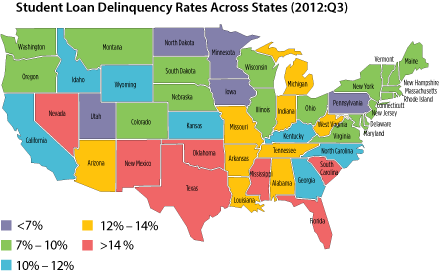Yesterday I took about 550 words to say essentially this : Once your CEO decides that 'Big Data' is the next big thing to upskill your organization's talent level it is on you as an HR or Talent pro to make that happen. (It was in the Times you know).
One of the ways, besides the more obvious ones like 'Invest in some new technology' or 'Take a statistics course' is to challenge yourself to starting thinking differently about information and data (and not the typical data you might be used to considering) and what it might or might not mean for your organization and your talent game.
Here's an example of what I mean pulled from a recent Business Insider piece on some data around student loan debt load and default rates by State, (and let's assume for the purposes of this exercise that college recruiting and hiring is an important part of your workforce planning).
Chart 1 - Average Student Loan Debt

Dang, that doesn't look good anywhwere, but student debt loads seem particularly high in certain states and regions. Let's take this one more step.
Chart 2 - Average Student Loan Delinquency Rates

Interesting - not perfect alignment between the states with the highest average student loan levels and the highest default rates. But nevertheless, there are some pretty large sections of the country with average default rates at 15% or more. So the exercise is this - what, if anything would or should you do with data like this, (incomplete as it is, bear with me, it's just an example to make us think).
What if you are recruiting college grads or soon-to-be grads in the parts of the country with the highest debt loads and default rates?
Would that change your approach at all to things like signing bonuses or retention schemes that have an element of student loan repayment built in?
Would you formulate a plan for more strategic counter-offers for your younger talent that is likely to be much more receptive to make a jump to a competitor for even a small bump in salary?
Would you consider overpaying in the first few years for the best college grads knowing that some or even most of them have pretty significant financial worries outside of work?
Would you make access to a financial planner or accountant part of your signing package?
Or would you do nothing at all?
The point to all this is not really the student loan data, but rather to raise just one possibility of the potential and challenge that big data holds for you as a Talent pro, and to try and illustrate that using data to your advantage is likely going to require not just technical skills, but the ability to think differently about what drives your business.
And like we established yesterday, since it hit the Times, you can't pretend it doesn't matter for much longer.